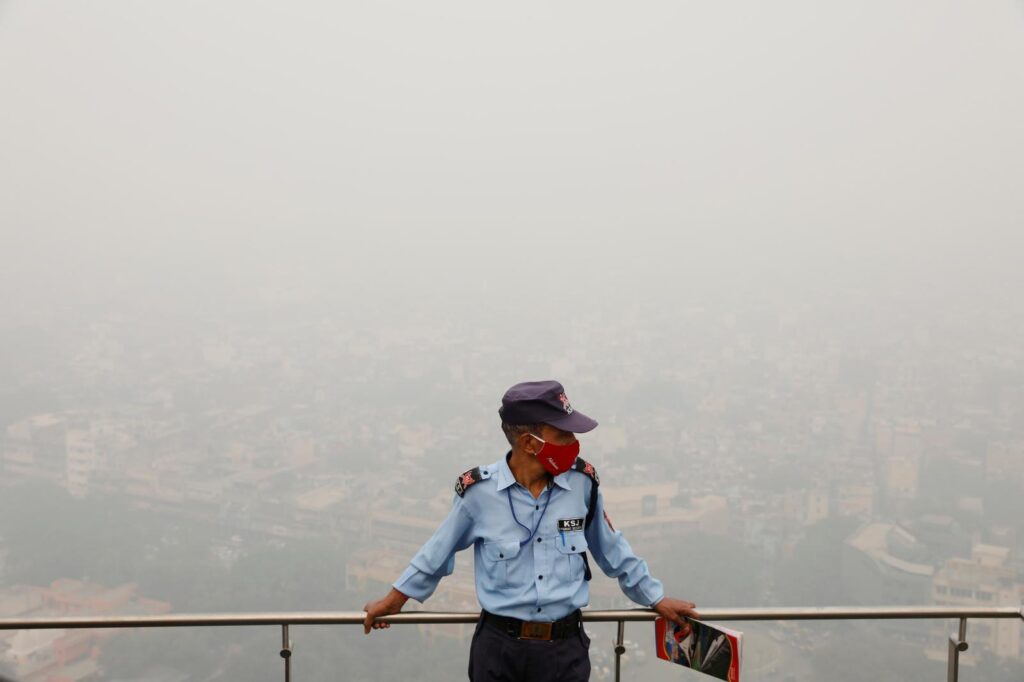If Stubble Burning Ended In Dec, Why Is Delhi’s AQI Still ‘Severe’?
Jan 30, 2024 | Pratirodh Bureau
A security guard stands on top of a building amidst heavy fog in New Delhi
Although the days when parali (stubble) burning in the neighbouring states of Punjab and Haryana was blamed solely for rising pollution levels in Delhi — from October to the first week of December — are long over. However, as January ends, the capital of the nation finds itself fluctuating between ‘very poor’ to ‘severe’ levels of the air quality index (AQI) in the city.
People residing in Delhi now find themselves grappling with a thick blanket of smog, raising questions about the root causes of this severe pollution and prompting health warnings.
Experts say one major contributing factor to the poor air quality in Delhi during the winter months is temperature inversion. Chandraveer Singh, an environmentalist says, “The city often experiences temperature inversions, where a layer of warm air traps cooler air close to the ground. This phenomenon hampers the dispersion of pollutants, leading to their accumulation in the atmosphere. As a result, PM 2.5 levels surge, causing respiratory concerns, and the levels have not come down below 350.”
According to experts, the high population density and increasing vehicular traffic in Delhi is also responsible for contributing significantly to air pollution. Singh says, “Vehicle emissions release a cocktail of pollutants, including particulate matter, nitrogen dioxide, and carbon monoxide. Industrial activities in and around the city play a role in deteriorating air quality. Stricter measures may be necessary to curb emissions from these sources.”
According to the Central Pollution Control Board, at 4 pm on Sunday, 28 January, the Anand Vihar station continued to be in the “severe” category with PM 2.5 at 416 while PM 10 at 378 and NO2 at 112. The PM 2.5 and PM 10 were at 442 and 421, in the “severe” category even at Bawana station. These two are not isolated stations. Others, including Jahangirpuri, Okhla Phase-II, Mundka, Mandir Marg AQI stations were also recording “severe” levels.
An AQI between zero and 50 is considered good; 51 and 100 satisfactory; 101 and 200 moderate; 201 and 300 poor; 301 and 400 very poor; and 401 and 500 severe.
Although the Graded Response Action Plan (GRAP) I & II are in force, experts do not think that they are helping curb or bring down pollution levels.
Experts identified unfavourable meteorological conditions, followed by a drizzle on Tuesday night, calm wind patterns, dense fog, inversion and low temperatures as contributing to the entrapment of pollutants.
Typically, while rain aids in the settling of pollutants, in this case, a mere drizzle has led to a deterioration in air quality. Singh said, “Meteorology is playing a major role, with all other consistent sources operating as usual.”
GRAP Stage III measures were implemented for the third time this winter. Enforced initially from 2 to 28 November, and then again from 22 December to 1 January, these restrictions were reintroduced on 14 January following a deterioration in Delhi’s AQI to 447, categorising it as “severe”, but revoked on 22 January.
Owing to the disruptive impact of these restrictions on a significant number of stakeholders and the general public, the decision to lift GRAP Stage III was taken by the CAQM (Commission for Air Quality Management). According to a CAQM official, the move also considered the improvement observed in the average AQI.
